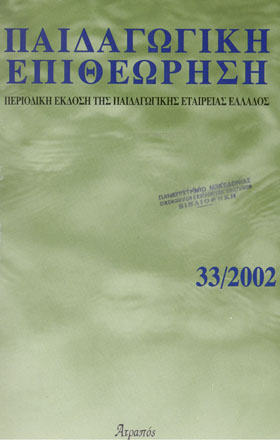Μεθοδολογικές επιλογές για τη συνεκπαίδευση παιδιών με και χωρίς ειδικές εκπαιδευτικές ανάγκες
Main Article Content
Περίληψη
The major obstacles of inclusive education of children with Special Educational Needs in Greek primary schools arc the insufficient teaching time, the extended content of the Curriculum, the lacking of expert knowledge on the part of the class teacher and the appropriate teaching support of the students not presenting with special needs. Aim of the present research was the specification of effective methods for overcoming these obstacles. To these end four students visiting the 1st, 2nd, 3rd, and 6th class of four different schools, and presenting with Learning Disabilities were supported by means of an inclusion program which lasted 6 months. According to the research results a main problem, of inclusion, that of the insufficient teaching time, can be solved through the adoption of Team -Assisted Individualization, which is a form of Cooperative Learning. Another major obstacle of inclusion, the one posed by the large extent and the rigid structure of the information contained in the student books, could be overcome through the selection and use of those parts of the content, that serve directly the achievement of the aims and objectives of the program, in reference to the specific students of each class. This fully legitimate action according to the true spirit of the Curriculum being implemented. Another helpful measure toward the same end is the daily use of Educational Assessment. Regarding the Special Education knowledge needed by the ordinary classroom teachers, so that they can cope with the demands of inclusive education, our experience showed that it can be acquired through in. service training and constant support by specialists. Finally, as far as the achievement of the other students of the class is concerned, there was no negative development observed.
Article Details
Τεύχος
Ενότητα
Άρθρα
